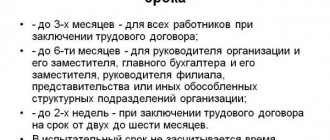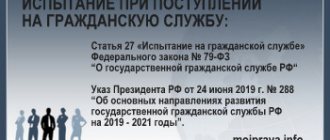Last modified: January 2021
Labor legislation provides for the possibility of scheduling an employee check within a certain period of time. In some situations, an extension of the probationary period is considered if it was not possible to verify the information during the allotted period.
When hiring an employee, the employer expects compliance with the characteristics stated in the resume and during the interview. Only time will tell how well the selected applicant meets the requirements and is ready for productive work after employment. The presence of a person on probation gives the right to the parties to the labor relationship to terminate the contract in a simplified unilateral manner. This right corresponds to the interests of both employers who were disappointed in the abilities of the hired person, and employees who, after signing the contract, discovered that the working conditions and pay were not satisfactory. In such a situation, the initiator of termination does not need to look for additional reasons and grounds; within the established time frame, it is enough to simply communicate the intention to separate.
Basic moments
Dear readers! The article talks about typical ways to resolve legal issues, but each case is individual. If you want to find out how to solve your particular problem , contact a consultant:
8 (800) 700 95 53
APPLICATIONS AND CALLS ARE ACCEPTED 24/7 and 7 days a week.
It's fast and FREE !
Labor legislation allows you to order a check when hiring (Article 70 of the Labor Code of the Russian Federation, Article 71 of the Labor Code of the Russian Federation). The employer and employee agree on the probationary period by mutual consent.
The duration of the probationary period is specified in the hiring order and the employment contract.
It happens that the employer extends the probationary period. Let's consider whether he has the right to do this and in what situations the extension will be legal.
Is it possible?
As a general rule, the inspection should last no more than three months. For some categories of personnel, the probationary period is six months.
The duration of the trial is agreed upon once upon signing the employment contract. Extending the inspection period is prohibited, even if the employee agreed to the extension.
In fact, the employer may decide to arrange a trial for a period shorter than permitted by law.
In this situation, it is impossible to replace the employee’s probationary period from one month to two.
Rostrud adheres to this point of view and provides explanations in Letter No. 520-6-1 dated 03/02/2011. However, there are exceptions to this rule.
End of trial period
Even if the employer has a legal basis to extend the probationary period, at the end of it it is necessary to make a decision whether the employee has completed this period or not. If the employer has not taken any action and the employee continues to perform professional duties, then he has successfully passed the test.
An employee who fails to complete the probationary period is subject to dismissal. The dismissal must be formalized in accordance with all the rules, otherwise this action may be challenged in court and lead to the payment of monetary compensation.
- drawing up a notice that the employee has not completed the probationary period. The document must indicate the reasons for dismissal. All claims against the employee that arise during the probationary period must be documented. The notice must indicate on what date he is subject to dismissal. The document is drawn up in 2 copies;
- delivery of notice to the employee 3-4 days before the expected date of termination of the employment contract;
- obtaining the employee’s signature indicating that the document has been provided to him. If he does not want to sign the notice, then an act is drawn up in which at least 2 witnesses must sign;
- directly the dismissal itself and the final payment in accordance with labor legislation. It is necessary to take into account that the dismissal of employees who have not passed the probationary period is subject to all restrictions regarding dismissal at the initiative of the employer. For example, you cannot fire a pregnant employee or a temporarily disabled employee.
If the employee himself decides before the end of the probationary period that this job is not suitable for him, he notifies the employer 3 days in advance. He does not have to work for 2 weeks.
Possible reasons and reasons
The probationary period can be extended to the maximum extent possible in a situation where the employee is absent from work.
Due to sick leave
During the test, the employee may become ill. In this case, sick leave is issued and temporary disability benefits are paid.
During the period of sick leave, the probationary period is suspended. After the employee recovers, the testing time increases by the number of days missed.
Due to vacation
With the employer's permission, an employee may go on vacation during the probationary period.
Unplanned rest does not shorten the internship time.
When an employee returns to the workplace after rest, the employer increases the probationary period.
All days on vacation are taken into account.
If the employee took leave without pay, the days of his absence also increase the verification period.
By agreement of the parties
There is an opinion that by agreement of the parties the probationary period can be extended.
This can be done in a situation where it was initially set less than the maximum permissible.
Supporters of this position refer to the fact that the law allows for amendments to the employment contract by signing an additional agreement.
Since this point of view contradicts the opinion of Rostrud, it is more advisable to set the maximum possible period when hiring.
This will avoid a legal dispute if the employee subsequently believes that his rights have been violated and files a lawsuit.
At the request of the employee
The Labor Code of the Russian Federation does not say anything about the possibility of extending the inspection at the employee’s request. There is also no ban on such an operation.
In this situation, it will be considered legal to increase the probationary period only if the employee is absent from the workplace due to illness, vacation, absenteeism, etc.
Due to absenteeism
In addition to the extenuating circumstances of absence from work during the test, absenteeism may occur. In fact, it does not matter for what reason the employee did not show up for duty.
The employer draws up reports of the employee’s absence from the workplace. When a person returns to work, the missed days are added to the check period.
Who wants and can defend their position
If, when registering a new employee with an organization, he is assigned a test, then the period can be increased. But such an action can only be performed in a situation if it was initially assigned a period less than the limit.
The following can be said to substantiate this position. In the employment contract, the paragraph about being on probation is written as an additional condition.
The Labor Code says that the terms of an employment contract can be changed by drawing up an additional agreement, unless they relate to individual situations specified in the code.
In addition, this regulatory act does not contain a direct prohibition on changes to an already accepted condition on being on probation. It follows from this that it is possible to change it, but using an additional agreement.
bukhproffi
Attention! It follows that if the employee was initially awarded a probationary period shorter than the longest permitted duration, it is allowed to increase it to a full one, but with the obligatory execution of an additional agreement
In what cases is it prohibited?
For some categories of persons, it is prohibited to establish a test when signing an employment contract.
These include:
- pregnant women going on maternity leave;
- women with children under one and a half years old;
- minors;
- young specialists who have received a diploma and have not worked anywhere before;
- disabled people of the first group;
- pensioners;
- persons elected to positions through competition;
- employees in elected positions;
- transferred from another employer;
- signed a fixed-term contract for two months.
Is it possible to quit during a probationary period without working? Find out from the article. Is there a probationary period for part-time employment? About this - here.
Recommendations for the employer
There are a limited number of options for legally increasing the probationary period. Its duration must be fixed in the employment agreement. Even if this condition was verbally agreed upon during employment, but there is no information about this in the contract, the employee will be enrolled without a probationary period. The employer will not be able to determine the candidate's professional level. Therefore, it is recommended to take a responsible approach to drawing up an employment contract and indicate in this document the maximum probationary period possible by law. If an applicant for a position proves himself to be a qualified specialist, he can always be laid off.
Extension of probationary period in 2021
Regardless of the reasons and goals pursued by the employer, when extending the probationary period, he must act in accordance with the law.
Conditions
Legal conditions for extending the probationary period include the employee’s absence from the workplace due to sick leave, vacation, time off, etc. The employee must provide supporting documents.
How to renew and register?
The extension of the inspection period is documented.
Extension order
First of all, an order is created to extend the probationary period. It indicates the reason for prolonging the test and the number of working days by which its period is extended.
Sample order:
Order to extend the probationary period
Notification
Due to the fact that the extension of the inspection period will entail a change in the terms of the employment contract, the employer notifies the employee in writing.
Sample notification:
Notice of extension of probationary period
Additional agreement
In the HR department, the employee reads the order and signs an additional agreement to extend the probationary period.
A sample additional agreement is here:
Additional agreement on IP extension
In practice, in most cases, the employer is limited to issuing an order to extend the probationary period. In this case, no additions to the employment contract are made by a separate agreement.
Considering the norms of labor legislation, this is not entirely correct. After all, the verification condition can be included in the employment contract as an additional condition.
Extending the probationary period effectively changes the agreement concluded between the employee and the employer. Therefore, it is necessary to sign the addenda.
Maximum duration
The maximum duration of probation during recruitment is three months. For some positions, verification can last up to six months.
The probationary period cannot be extended beyond the limits provided by law. The minimum testing period is two weeks.
Registration procedure
Draw up an additional agreement to the employment contract
The clause in the employment contract regarding the employee passing the test is essential. Therefore, if it changes in any direction, it is necessary to document this step using an additional agreement to the employment contract.
Order to reduce probation period
To shorten the probationary period, the administration needs to prepare an appropriate order about this.
To do this, you can use the company’s letterhead and freely record the decision to terminate the test.
If the order is not drawn up on letterhead, you need to write down the name of the company, its registration data, and the address of the company at the top of the sheet.
Below, in the middle of the line, the name of the administrative document “Order” is written.
The order number is also recorded here according to the order registration book. Under it, this document will be reflected in the company’s records in the future.
Next, you need to record the place and date of execution of this order, after which in the next line write down its short name, for example, “On reducing the probationary period.”
The personnel service can reflect in the water part the reason for drawing up this order. This block is indicated before the word “I ORDER”.
Then the narrative part of the order is drawn up. Here the person in charge indicates the position and personal data of the person working at the enterprise whose trial is being terminated. In this case, the date from which the probation period is canceled must be reflected.
This part must also contain the basis for termination of the test. It is necessary in this part to reflect the details of the additional agreement signed between the parties to the employment contract.
The order is endorsed by the director of the company with his full name deciphered.
Below in the document there must be a familiarization visa for the employee, which confirms that he knows about the contents of the order.
Nuances
As a rule, increased requirements for a probationary period are imposed on certain categories of employees.
To a civil servant
For those who wish to enter the civil service, the verification period is set between three months and one year. If the job applicant transfers from another government agency, the duration of the trial can be from three to six months.
Special rules regarding civil servants are established by the law on the state civil service in Russia, and not by the labor code.
Federal Law of July 27, 2004 N 79-FZ
Chief accountant
An increased verification period of up to six months is established for the chief accountant. It begins to operate from the moment you are hired.
When transferring to this position, no verification is assigned. Therefore, as an option, a temporary transfer of an employee is arranged. If, after the expiration of the temporary period of work in a new position, the employee fails to cope with his duties, the employer has the right to return him to his old position.
For managers
Managers belong to a special category of workers. Therefore, special requirements are placed on them.
This also applies to the probationary period of the head of the organization, which is set within a six-month period.
The Civil Code clearly defines that divisions should be considered those elements of the company that are included in the Unified State Register of Legal Entities and have their own position and property.
It should be remembered that department heads do not belong to the category of managers, therefore a general inspection period of three months is established for them.
Employer's liability for illegal extension
If the employer decides to increase the probationary period on his own initiative without legal grounds, then he may be held administratively liable.
The Code of Administrative Offenses of the Russian Federation (Article 5.27 of the Code of Administrative Offenses of the Russian Federation) provides for punishment in the form of a fine for officials in the amount of ten to twenty thousand rubles, for entrepreneurs - from five to ten thousand rubles, for organizations - from fifty to one hundred thousand rubles.
As a rule, violations are detected when an employee files a complaint against the employer with the labor inspectorate. In practice this does not happen often.
What are the essential terms of an employment contract? Read our article. How to register failure to complete the probationary period? Find out here.
How to write a notification to an employee about changes to the job description? See here.
Questions
Is unilateral action allowed without notice to the employee?
Current legislation provides the right to change an employment contract unilaterally. The employer has the right to do this if the technological and organizational working conditions have changed.
With proper legal registration, the employer theoretically has the opportunity to change the duration of the probationary period. For example, additions are made to the job description, establishing a longer probationary period for the employee.
At the same time, Rostrud made it clear that the test period is assigned only at the time of applying for a job. Therefore, it is not possible to extend the inspection period of the Labor Code of the Russian Federation.
Thus, given the controversial nature of this situation, it is advisable to set the maximum possible period of testing when hiring; extending the test may cause problems in the future.
Is it possible for a period longer than 3 months?
Most positions have a probationary period of three months. For a number of specialists it is established within six months (managers and chief accountant). In the civil service, extended periods range from three months to a year.
Consequently, establishing a verification period of more than three months is permitted only in cases strictly stipulated by law.
As you can see, the legislator has determined the maximum terms for conducting testing when applying for a job.
The inspection should be extended only if it was interrupted due to the employee’s absence from the workplace.
Situations where the probationary period was initially set less than acceptable and the employer later wants to increase it are considered controversial. It is recommended to adhere to the position of Rostrud.
Attention!
- Due to frequent changes in legislation, information sometimes becomes outdated faster than we can update it on the website.
- All cases are very individual and depend on many factors. Basic information does not guarantee a solution to your specific problems.
That's why FREE expert consultants work for you around the clock!
- via the form (below), or via online chat
- Call the hotline:
- 8 (800) 700 95 53
APPLICATIONS AND CALLS ARE ACCEPTED 24/7 and 7 days a week.
Probation
Time to take a closer look
In essence, the probationary period is set aside so that the employer can take a closer look at the potential employee. In the time allotted by law, the head of the enterprise can determine whether the employee has the necessary professional qualities or whether his skills do not meet the employer’s expectations. Whereas an employee can soberly assess his capabilities and familiarize himself with the internal rules. Moreover, during the probationary period, the employee is subject to all provisions of the Labor Code of the Russian Federation.
In other words, the tested employee is a full-fledged subject of labor relations.
According to general rules, the decision to apply a probationary period is made by the employer. However, it must be agreed upon with the future employee when concluding an employment agreement (Article 70 of the Labor Code of the Russian Federation). If the contract does not stipulate a probationary period, then the subject is considered hired. The hiring regulations require execution by a separate order, which must also indicate the probationary period (Article 68 of the Labor Code of the Russian Federation).
At the testing stage, the following employee qualities are assessed:
- ability to perform assigned duties;
- timely performance of basic functions;
- ability to work in a team.
If during the probationary period the employee has completed the tasks assigned to him, and the designated time has expired, then he is considered to have passed the test, provided that he continues to perform the functions assigned to him.
In this case, the employer does not have to issue an additional order to hire the employee.
The hiring mechanism in some cases requires strict compliance with the law. This is the case with hiring a foreigner.
Learning to participate in tenders is not difficult. Find out everything about the procedure.
At the same time, if an employee turns out to be unfit to perform the duties assigned to him, cannot find a common language with the team or violates internal labor regulations, the employer has the right to terminate the employment contract with him.
The following procedures must be followed:
- Send or give the employee a written notice indicating the reasons for dismissal 3 days before the event occurs. The decision may be justified by complaints from colleagues, explanatory or internal memos, acts on the release of defective products or disciplinary action, or an order to impose penalties.
- Obtain the employee's signature confirming receipt of the notice . And in case of refusal to receive it, draw up an appropriate act. The document is drawn up in the presence of two witnesses.
- Issue an order to terminate the contract with the employee (Article 71 of the Labor Code of the Russian Federation). The order forms were approved by Resolution of the State Statistics Committee dated January 5, 2004 No. 1. There are two types of orders:
- for the dismissal of one person (Dismissal Order T-8);
- for the calculation of several employees (Dismissal Order T-8a).
- Make an entry:
- to the employee’s personal card (T-2);
- to the employee’s personal account (T-54).
- Pay the employee on the day of dismissal:
- salary for actual time worked;
- compensation for unused vacation (Article 127 of the Labor Code of the Russian Federation).
- Make an entry about the payment in the work book, with reference to Art. Articles 77, 81 of the Labor Code of the Russian Federation.
- Issue a document on labor activity to the employee (Government Decree No. 225 dated April 16, 2003).
Termination of an employment agreement can occur at the initiative of the employee, for example, if during the probationary period he realized that the proposed job for certain reasons was not suitable for him. Termination of the agreement occurs in the same manner as provided for the employer.
In addition, an employee can submit an application for payment even during incapacity for work (letter of Rostrud dated 09/05/2006 N 1551–6).
Whereas an employer cannot initiate the dismissal of an employee who is on sick leave. If the employee decides to quit after the end of the probationary period, then in this case he must notify the employer two weeks before the event occurs (Article 80 of the Labor Code of the Russian Federation).
In practice, situations often arise when, when dismissing an employee whose probationary period has not expired, the employer requires him to work an additional two weeks. However, such demands are illegal. And the maximum period that a dismissed person is required to remain at work is no more than 3 days , i.e. exactly the period of time that is necessary to notify the employer of termination of the employment agreement at the initiative of the employee (Article 71 of the Labor Code of the Russian Federation). If the contract is terminated by the head of the organization, then the employer’s notice of termination of the employment relationship must be sent no less than a month before the occurrence of the event, and, therefore, the working period is equal to this period (Article 280 of the Labor Code of the Russian Federation).
The dismissal of employees by the employer after completion of the probationary period is carried out on a general basis. However, we should not forget that an employee can appeal the decision to dismiss him in court. For this, the law sets aside a month period, which is calculated from the moment a copy of the order is delivered or from the day the work book is issued.
The manager's decision to dismiss may be considered illegal due to violation of the dismissal procedure:
- there is no documentary justification for the decision;
- the employee was not properly notified.
Purpose of IP
As already mentioned, the main purpose of the probationary period is to determine the professional suitability of a particular applicant for a job. In this case, the employer can hire the employee immediately based on the results of the interview.
The probationary period is of a advisory nature and, therefore, is applied solely at the initiative of the employer.
However, in some cases the law prohibits the use of a probationary period (Article 70 of the Labor Code of the Russian Federation). It is expressly prohibited to apply it to the following persons:
- pregnant women and mothers who support a child under 1.5 years of age;
- workers who have not reached the age of majority;
- university graduates finding employment in their specialty for the first time within a year;
- employees elected to elective positions;
- transfer employees (if there was an agreement between employers);
- employees with whom an employment agreement is concluded for a period of no more than 2 months.
Also do not pass the test:
- Persons who have completed an apprenticeship at the direction of the employer (Article 207 of the Labor Code of the Russian Federation).
- Citizens who perform alternative service (clause 41 of the Regulations).
- Persons who have received higher education in accordance with an agreement on targeted training followed by public service (Article 27 of the Law).
In addition, collective agreements may provide for additional categories of citizens who are exempt from serving a probationary period at the enterprise.
If the employment contract provides for a trial period, then in order to prevent possible reasons for dismissal, the employee must:
- Determine evaluation criteria and document them in the employment agreement.
- Familiarize yourself with the work plan for the accounting period and strictly adhere to it.
- Avoid conflicts with the company team.
- Improve your competence whenever possible.
See also the video about establishing a probationary period for employment
Standard terms
According to the requirements of labor legislation, the probationary period should not exceed three months. To evaluate the professional qualities of the branch manager, the period can be increased to 6 months (Article 70 of the Labor Code of the Russian Federation).
If a short-term agreement is concluded with a future employee, for example, for a period of 6 months, then the trial period should not be more than two weeks.
When concluding a contract with a person entering the civil service, the probationary period can be increased to 1 year (Article 27 of the Law).








